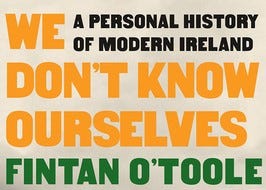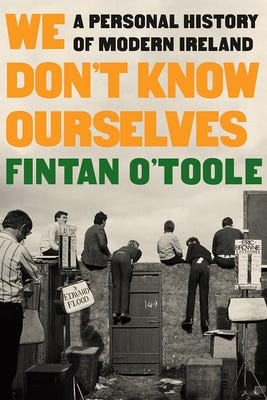We Don't Know Ourselves: A Personal History of Modern Ireland
by Fintan O'Toole
2021
I listened to this as an audio book, and very much enjoyed it. To write this review, however, I wish I had a physical book, so I could flip back and forth to remind myself of certain juicy details. What I want to convey is, wow, what a book - it is both a memoir of the author and a memoir of Ireland, both the Republic and Island, particularly of the past century, from the 1916 Easter Rising, through to the Celtic Tiger's roar and collapse. Or as the subtitle notes: A Personal History of Modern Ireland.
The author was born in 1958, the same year the Irish government opened the country to foreign investment. What followed were consequences, but, before we can get to the consequences, O'Toole has to set up why the 1958 action is a pivotal before/after moment for the evolution of the Irish state, a quiet bureaucratic twist in a national narrative more full of revolutionary fervor.
Ireland achieved independence from the British Crown, except for the six counties in the north. The Republic was dominated by the Catholic Church, heart-full of sentimental rural life fueling a feeling of exceptionalism against the modern world. Ireland remained neutral during World War II. Millions of Irish were more interested in prosperity in America than in sentimental exceptionalism at home. The national culture was full of silences and evasions: sexual abuse in the church, financial fraud amongst its political elite.
In the late-1960s, the beginning of the Troubles in North Ireland revived nationalist dreams and shattered other ones. Throughout it all, O'Toole grew up, spending childhood in a Dublin housing estate, then getting the university education denied or never dreamed of by previous generations. He became a journalist and rightly so, because he is a keen observer and a sharp analyst. He sees the patterns and brings to the surface all that is hidden. All? Well, an awful lot. This is modernity, the shattering of illusions. Hence the title.
Someone must write a book like this about Canada, surfacing the patterns and shattering the illusions. George Bowering perhaps tried (or this one, reviewed by me), but there is space for a new generation to take another go at it. O'Toole was close to many sources and stories via his journalism, and he tells all with exquisite pacing. The financial fraud was all new to me, and it seemed so pervasive as to be almost unreal. I am not among the "ourselves" of the title, so I suggest an alternate title for foreign readers: You Don't Know Us. No, I surely didn't, but I'm smarter than that now.





Just finished this book. Agree it was well-written, personally & professionally informed & illusion-shattering & found it fascinating to read about the "double-think" & "compartmentalization" that existed for decades. Which I experienced 1st hand in a 1993 visit, in which a rural pub would close at 11 sharp to comply with the law, cops would knock on the door & everyone would stay quiet til they left after which drinking etc would resume. It would be harder to write such a book about Canada, as Ireland - at least as depicted here - seems like a much smaller, insular country with a particularly cozy establishment. But a book could be written about Canada about our own hypocrisies - i.e. that we're allegedly more virtuous than the US, that we matter as much internationally, or are as liberal & tolerant as we like to think we are. And our "establishment" may not be as cozy, but there is still an insularity & groupthink among our own elites